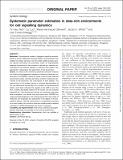Systematic parameter estimation in data-rich environments for cell signalling dynamics
Author(s)
White, Jacob K.; Nim, Tri Hieu; Luo, Le; Clement, Marie Veronique; Tucker-Kellogg, Lisa
DownloadWhite_Systemic parameter.pdf (594.1Kb)
OPEN_ACCESS_POLICY
Open Access Policy
Creative Commons Attribution-Noncommercial-Share Alike
Terms of use
Metadata
Show full item recordAbstract
Motivation: Computational models of biological signalling networks, based on ordinary differential equations (ODEs), have generated many insights into cellular dynamics, but the model-building process typically requires estimating rate parameters based on experimentally observed concentrations. New proteomic methods can measure concentrations for all molecular species in a pathway; this creates a new opportunity to decompose the optimization of rate parameters.
Results: In contrast with conventional parameter estimation methods that minimize the disagreement between simulated and observed concentrations, the SPEDRE method fits spline curves through observed concentration points, estimates derivatives and then matches the derivatives to the production and consumption of each species. This reformulation of the problem permits an extreme decomposition of the high-dimensional optimization into a product of low-dimensional factors, each factor enforcing the equality of one ODE at one time slice. Coarsely discretized solutions to the factors can be computed systematically. Then the discrete solutions are combined using loopy belief propagation, and refined using local optimization. SPEDRE has unique asymptotic behaviour with runtime polynomial in the number of molecules and timepoints, but exponential in the degree of the biochemical network. SPEDRE performance is comparatively evaluated on a novel model of Akt activation dynamics including redox-mediated inactivation of PTEN (phosphatase and tensin homologue).
Date issued
2013-02Department
Massachusetts Institute of Technology. Department of Electrical Engineering and Computer ScienceJournal
Bioinformatics
Publisher
Oxford University Press
Citation
Nim, T. H., L. Luo, M.-V. Clement, J. K. White, and L. Tucker-Kellogg. “Systematic Parameter Estimation in Data-Rich Environments for Cell Signalling Dynamics.” Bioinformatics 29, no. 8 (February 19, 2013): 1044–1051.
Version: Final published version
ISSN
1367-4803
1460-2059